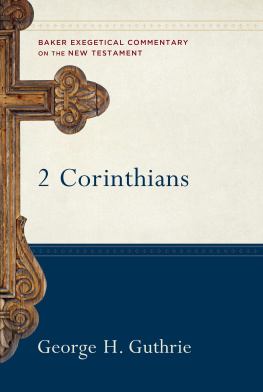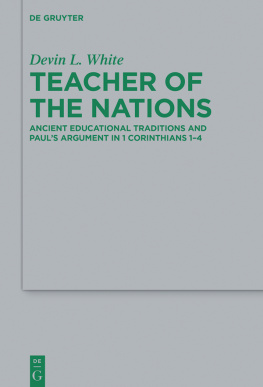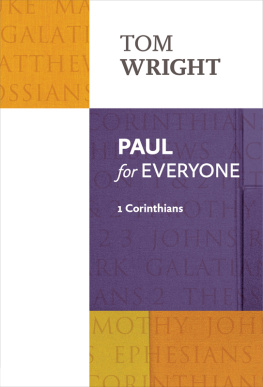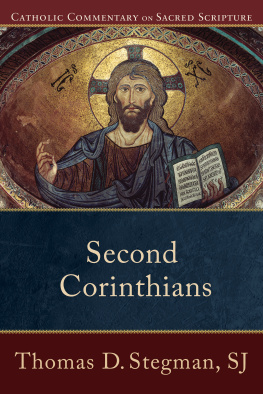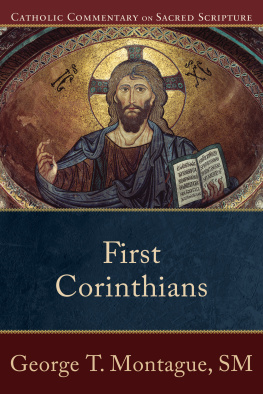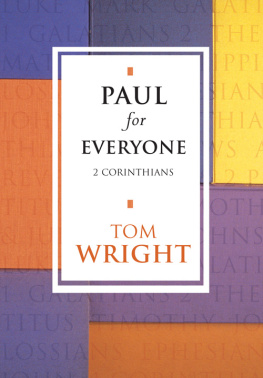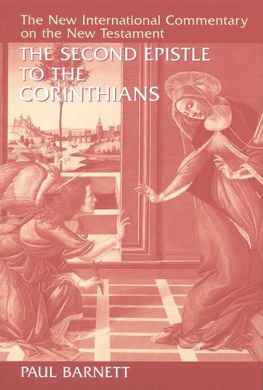Paul Barnett - The Message of 2 Corinthians
Here you can read online Paul Barnett - The Message of 2 Corinthians full text of the book (entire story) in english for free. Download pdf and epub, get meaning, cover and reviews about this ebook. publisher: Inter-Varsity Press, genre: Religion. Description of the work, (preface) as well as reviews are available. Best literature library LitArk.com created for fans of good reading and offers a wide selection of genres:
Romance novel
Science fiction
Adventure
Detective
Science
History
Home and family
Prose
Art
Politics
Computer
Non-fiction
Religion
Business
Children
Humor
Choose a favorite category and find really read worthwhile books. Enjoy immersion in the world of imagination, feel the emotions of the characters or learn something new for yourself, make an fascinating discovery.

- Book:The Message of 2 Corinthians
- Author:
- Publisher:Inter-Varsity Press
- Genre:
- Rating:5 / 5
- Favourites:Add to favourites
- Your mark:
- 100
- 1
- 2
- 3
- 4
- 5
The Message of 2 Corinthians: summary, description and annotation
We offer to read an annotation, description, summary or preface (depends on what the author of the book "The Message of 2 Corinthians" wrote himself). If you haven't found the necessary information about the book — write in the comments, we will try to find it.
The Message of 2 Corinthians — read online for free the complete book (whole text) full work
Below is the text of the book, divided by pages. System saving the place of the last page read, allows you to conveniently read the book "The Message of 2 Corinthians" online for free, without having to search again every time where you left off. Put a bookmark, and you can go to the page where you finished reading at any time.
Font size:
Interval:
Bookmark:
av The Authorized (King James) Version of the Bible, 1611
Barrett C. K. Barrett, The Second Epistle to the Corinthians (A&C Black, 1973)
Calvin John Calvin, Calvins Commentaries (Associated Publishers and Authors, no date)
Denney James Denney, II Corinthians (Hodder and Stoughton, 1894)
Eusebius Eusebius, The History of the Church ( ad 325; translated by G. A. Williamson, Penguin, 2nd edn, 1965)
Furnish Victor Furnish, II Corinthians ( Anchor Bible , Doubleday, 1984)
Goudge H. L. Goudge, The Second Epistle to the Corinthians ( Westminster Commentaries , Methuen, 1927)
Harris Murray Harris, The Expositors Bible Commentary , vol. 10 (ed. F. Gaebelein, Zondervan, 1976)
Hughes Philip Hughes, Pauls Second Letter to the Corinthians (Marshall, Morgan & Scott, 1962)
JSNT Journal for the Study of the New Testament
lxx The Old Testament in Greek according to the Septuagint, 3rd century bc
nasb The New American Standard Bible (1963, 1995)
niv The New International Version of the Bible (1973, 1978, 1984, 2011)
Nov. Test . Novum Testamentum
NTS New Testament Studies
rsv The Revised Standard Version of the Bible (NT 1946, 1971; OT 1952)
rv The Revised Version of the Bible (NT 1881; OT 1885)
TDNT Theological Dictionary of the New Testament , ed. G. W. Bromiley, 10 vols. (Eerdmans, 19641976)
Commentary references are ad loc.
This is the day of the mega-commentary. Two massive studies on 2 Corinthians have recently appeared Ralph Martins and Victor Furnishs in the Word and Anchor Bible series, respectively. The strength of such works is their attention to detail and the exhaustive research into the meaning of the text, the cultural background of the times and the views of other commentators over the centuries. But there is a weakness inherent in these great works, despite the best efforts of the authors and their editors. It is, simply, that these commentaries are so large, many, many times larger than Pauls original letter. The result is that, while they are very helpful about details, they are so long that it is very difficult for the reader to stay in touch with the main themes and emphases of the apostle.
It seems to me that Paul envisaged that this letter would be read straight through, not broken up into paragraphs and studied microscopically. Of course the mega-commentaries have their place; but smaller works are also very important. One of the strengths of the Bible Speaks Today series is the relative brevity of the exposition it offers. The writer is able to keep the readers attention focused on the apostles essential message.
Among the commentaries written prior to this century, those by Calvin and Denney are still very rewarding. More recently, Barrett and Hughes have made distinguished contributions to the 2 Corinthians library the former strongly historical, the latter powerful theologically. An outstanding brief commentary has been written by Harris.
The writing of this exposition has been a long odyssey for me. Long convinced that the letter was little read as a whole by Christians, I began speaking on it at a number of Bible conferences, culminating at the Church Missionary Society Summer School at Katoomba, New South Wales, in 1977. Since then a manuscript has been prepared in several drafts until it has reached this present form. In all this, I have enjoyed the kindly patience of John Stott and of Frank Entwistle from IVP, but above all of my wife Anita and our children David, Peter, Anne and Sarah.
The letter of 2 Corinthians is great biblical literature. It depicts a powerful debate between Paul on the one hand and, on the other, the alliance between his shadowy opponents who had recently come to Corinth and the local church members who supported them. It is a fascinating record of that conflict. Above all, however, the letter is important for its magnificent theological message that the power of God is brought to bear on human beings, not in their power, but in their weakness. My prayer is that my exposition will allow that message to be clearly heard.
paul barnett
Introduction
1 Cor. 5:9; 2 Cor. 2:34; 7:812.
1 Cor. 2:15; 4:813.
Acts 19:1; 1 Cor. 1:12; 9:5.
2 Cor. 6:14 7:1; 12:20 13:1.
See also E. A. Judge, The Social Identity of the First Christians, Journal of Religious History 2 (1980), pp. 201217; R. J. Banks, Pauls Idea of Community (Anzea, 1979); G. Theissen, The Social Setting of Pauline Christianity (T&T Clark, 1982); W. Meeks, The First Urban Christians (Yale University Press, 1983).
C. K. Barrett, Pauls Opponents in II Corinthians, NTS 17 (1971), pp. 233254, for a survey of opinions on the identity of the newcomers and for Barretts own views.
P. W. Barnett, Opposition in Corinth, JSNT 22 (1984), pp. 317.
Acts 21:40; 22:2.
See, e.g., the poetic thirteenth chapter of 1 Corinthians.
See P. W. Barnett, op. cit.
Ibid.
Chapter 1
In placing his name and title at the beginning of the letter, Paul was following the convention of that time. The word apostle meant someone sent by, and acting as an agent for, someone else; a delegated representative.
Acts 18:24 19:1; 1 Cor. 1:12; 3:5; 9:5; 16:12.
2 Cor. 2:17 3:1; 10:12; 11:45, 1214, 2023.
Acts 22:21; 26:17; 9:15.
Gal. 2:78, my translation.
Eph. 1:1; Col. 1:1; cf. Gal. 1:1.
2 Cor. 3:2; 5:13; 12:16, 12.
So called because of the belief that seventy people had been involved in the translation three centuries earlier.
2 Cor. 10:811; 13:10; cf. 1 Cor. 14:3638.
2 Cor. 10:813; cf. Phil. 2:12.
Gal. 2:79; 2 Pet. 3:16.
The words holy and saint are the same in Greek ( hagios ).
2 Cor. 3:18; Rom. 12:12.
Acts 18:118, 27 19:1.
Athens (Acts 17:34), Cenchreae (Rom. 16:12).
1 Cor. 1:1112 (divisions); 5:12 (toleration of incest); 6:1 (lawsuits); 8:9 (uncaring behaviour to weak Christians); 11:1721 (uncaring behaviour to the poor); 13:13 (egocentric, unloving display of gifts).
Rom. 1:7; 1 Cor. 1:3; Gal. 1:3; Eph. 1:2; Phil. 1:2; and Phlm. 3 have the identical phrase in the Greek.
The First Benediction, quoted in Barrett, p. 58.
Eph. 1:3; 1 Pet. 1:3.
Mark 14:27, but see Zech. 13:79.
Matt. 25:45. See T. W. Manson, The Sayings of Jesus (SCM, 1961), pp. 248252.
2 Cor. 4:7 ( hyperbole... dynameos ); 4:17 ( kath hyperbolen eis hyperbolen aionion baros doxes ); 12:9 ( dynamis en astheneia teleitai ).
Unlike the views of the Pharisees as expounded by Pauls later contemporary, the Jewish historian Josephus. According to him, Pharisees taught that human free will is the major factor in action, God merely cooperating with human decision. See The Jewish War 2.162163.
Alternatively, from many people.
Chapter 2
Acts 19:21; 1 Cor. 16:57.
Noun and verb forms occur twenty-five times.
Rom. 10:4. For an excellent general discussion see G. Goldsworthy, Gospel and Kingdom (Paternoster, 1981).
See further Rom. 1:2; 9:4; Luke 24:44.
Chapter 3
For further discussion see comments on 7:516.
Acts 16:8, 11; 20:56; 2 Tim. 4:13. C. J. Hemer, Alexandrian Troas, Tyndale Bulletin 26 (1975), pp. 79112.
Acts 14:27; Col. 4:3.
Titus 1:4.
See E. E. Ellis, Paul and His Co-workers, NTS 17 (1971), pp. 437452.
Chapter 4
See also 1:11; 4:15; 8:16; 9:15 for other references to thanksgiving, a profoundly important practice for Paul.
E.g. P. Marshall, A Metaphor of Social Shame, Nov. Test. 15/4 (1983), pp. 302317, by an interesting parallel in Seneca, suggests that the imagery denotes social shame.
Jewish War 7.132157.
2 Cor. 4:5, 11; 11:29; 12:11.
2 Cor. 5:11; cf. Acts 17:24.
2 Cor. 3:1; 4:2; 5:12; chs. 1013 passim .
2 Cor. 1:23 2:11; 7:516.
Font size:
Interval:
Bookmark:
Similar books «The Message of 2 Corinthians»
Look at similar books to The Message of 2 Corinthians. We have selected literature similar in name and meaning in the hope of providing readers with more options to find new, interesting, not yet read works.
Discussion, reviews of the book The Message of 2 Corinthians and just readers' own opinions. Leave your comments, write what you think about the work, its meaning or the main characters. Specify what exactly you liked and what you didn't like, and why you think so.

